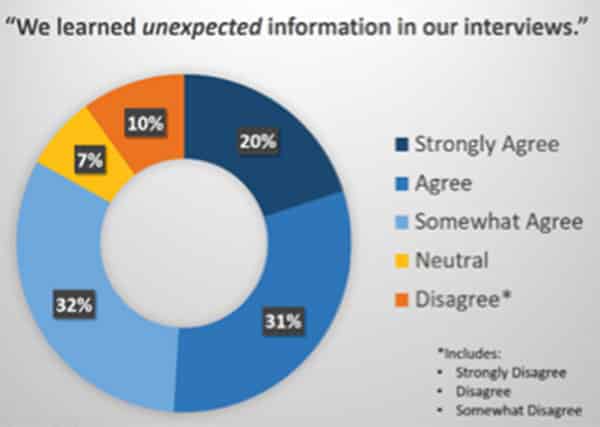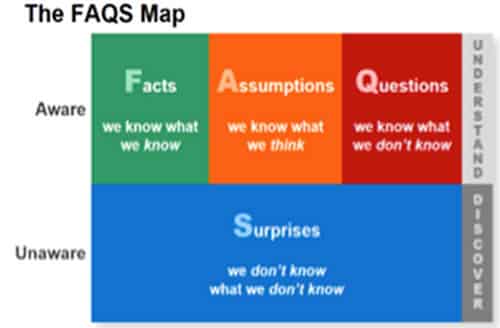Boost B2B Organic Growth by Letting Customers Surprise You

Why “Unexpected” is Good: Is it good to be surprised by your customers? It is, but it can feel “unnatural.” After all, in what area of business would you want to be surprised? When you’re building a facility, installing new software, or reviewing financial results? That would be no… no… and… no.
Business surprises are unwelcome, except when you’re innovating. Our US patent system is based on learning that which is unexpected. The US Patent Office won’t grant a patent unless the invention is “non-obvious” (as well as novel and useful). When they think about it, most people realize that the unexpected is good for suppliers’ solutions. But many fail to see why they should also welcome the unexpected in customers’ needs.
Think of it this way: If your understanding of customer needs is no better than your competitor’s, how will your new products consistently beat theirs in the market? Are your R&D people 20% brighter than their R&D people? Can you think of another way?
What if your competitors’ R&D department kept working on the same customer needs that everyone already knew about… but your R&D worked on new customer needs? Your R&D could develop new solutions in a competition-free environment.
The key to achieving profitable, sustainable organic growth is delivering value to your customers on needs important to them. Finding these needs before competitors is like giving your R&D a bicycle in a footrace.
A new study by The AIM Institute showed that B2B companies have a lot to learn about their customers’ needs – and this is a good thing. 150 Technical, marketing and sales professionals from 23 companies (two-thirds Fortune 500) took part in the study. After learning advanced interviewing methods, these individuals conducted a total of 700+ interviews with customers and customers’ customers.
The results were positive:
- 89% reported they were better able to listen to customers.
- 87% reported they gained a deeper level of understanding of customer needs.
- 85% said they gained valuable information.
Most interesting, though, was this: 83% reported they learned information during these interviews that was unexpected at some level. This surprised the researchers because most of these interviews were conducted in existing markets: Very few interviewers were exploring new-to-their-company market segments.
Understanding all the FAQS
To find unarticulated needs, the customer should lead the interviews, not the supplier. Instead of interviewing with a list of questions, it’s important to ask customers about their problems, and then probe on each. Using a methodology such as New Product Blueprinting enables interviewers to ask highly targeted questions so that they are able to uncover the problems and discover their customers’ unspoken needs. You can use the same approach asking about their “ideal world.” The more skillful the interviewing team, the better this works.
When a supplier approaches a market segment to gain insight, they should consider four levels of insight:
- Facts: We know what we know
- Assumptions: We know what we think
- Questions: We know what we don’t know
- Surprises: We don’t know what we don’t know
The typical supplier is aware of the first three, but unaware of the fourth (the surprises). Their goal should be to understand the first three… and discover the fourth. These surprises often become the inspiration for true innovation, but there’s a reason many suppliers fail. Depending on the product, consumer goods buyers may not be thinking deeply about their needs. As a result, some B2C suppliers have fallen into the habit of doing most of the hard thinking for end-consumers. They bring them solutions and ask, “So what do you think of this?”
That’s a questionable strategy for B2C, and a disastrous one for B2B suppliers adopting “hand-me-down” B2C approaches.
B2B buyers generally have high levels of knowledge, interest, objectivity, and foresight. B2B interviewers can learn an enormous amount from their customers, when they know how to ask. And if this new insight comes as a surprise that leads to blockbuster innovation… don’t be surprised.
Bring the best of the CEOWORLD magazine's global journalism to audiences in the United States and around the world. - Add CEOWORLD magazine to your Google News feed.
Follow CEOWORLD magazine headlines on: Google News, LinkedIn, Twitter, and Facebook.
Copyright 2025 The CEOWORLD magazine. All rights reserved. This material (and any extract from it) must not be copied, redistributed or placed on any website, without CEOWORLD magazine' prior written consent. For media queries, please contact: info@ceoworld.biz










